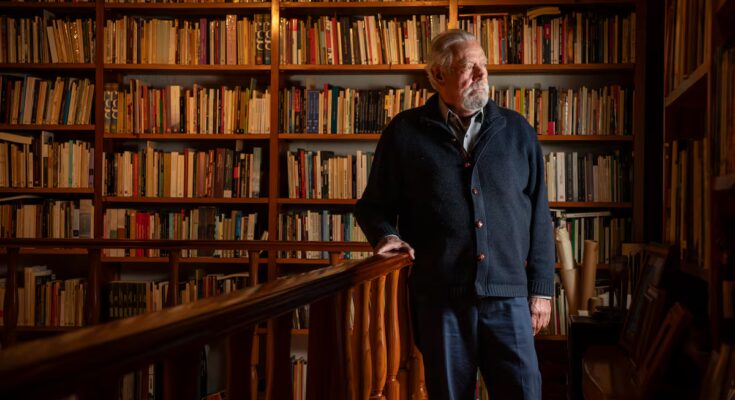As I progress through the final pages of That pile of broken mirrors (2025), the memoirs of Gonzalo Celorio recently published by Tusquets, his publishing house for more than three decades, I feel how I am invaded by the anguish and pain caused by reasons that the author provides us and which I will not reveal to the reader, but which in my case have a component that makes those sensations more incisive than they already are: and that is that with Gonzalo Celorio, the brand new and well-deserved Cervantes Prize of 2025, I am united from a friendship of more than 30 years and this is why I can feel their existential anguish and revealed physical pain as my own.
I’m not ashamed to confess that I write this review from a perspective of closeness and complicity. I almost don’t regret that the thousand words that were given to me are too few to comment on these memories which, with pain and anguish included, but also with many joys experienced and goals achieved, are in reality many living loves even when they present themselves as a succession of broken mirrors saved by memory.
Because the reflections and memories, very different and substantial, that the author reveals or accumulates over the course of his life – incomplete evocations, but “it is what it is”, as he warns us at the beginning of the story – are, in essence, declarations of love – or of his passions, as he describes them -: to literature, especially that of our language, to popular music, to books as deposits of text and as objects with personality, to Mexico City, to the Baroque, to food and spirits, to the theater, to its bars and cellars (some of them real clubs), teaching, UNAM, people, family (the subject of many of his works), “love and its simulacra”. But above all they reveal his strong declaration of love for a word, “the word that I like most in the Spanish language, the word word”, the affirmation with which he closes his personal journey, immersing himself in silence.
The author’s essential Mexicanness is primarily a cultural and historical belonging, but also a daily and street one.
Vital, but above all cultural and literary memories, essentially start from the university years of the 1960s, before and after the terrible events of the year 68, that of the Tlatelolco massacre caused by the intervention of the army in the rebel headquarters of the National University, until then autonomous, of Mexico. From this decisive starting point, the work not only introduces us to the author’s personal world, but also, and very much, to his relationship with the people who left profound marks on his sensitivity and his work. And with proverbial generosity, Gonzalo Celorio composes with his evocations homages to the dozens of characters who contributed in different ways and with peculiar intensities to shaping the path of his life, that of his literary, academic and institutional work.
Then there are tributes to masters such as those dedicated to Juan José Arreola (who spoke as he wrote), Edmundo O’Gorman (wise and mordant) or Carlos Fuentes (very cultured and sociable), the manifestation of his devotion to the work of Julio Cortázar, the recognition of the enormous cultural and social importance of the republican exile welcomed by Mexico, among countless figures and trials remembered and hailed by Celorio.
Something very significant that exudes from these evocations is the author’s essential Mexicanness, a belonging that turns out to be above all cultural and historical, but also daily and street, as can be seen in every page of the transition of a man who will soon arrive at literature although in his precise moment in his writing. The space most used to carry out this national militancy was Mexico City, the central stage of a life that is intertwined with the history, culture and dynamics of the unfathomable city that Celorio inhabits in all possible dimensions: from the turbulent neighborhood of Mixcoac, on the edge of the popular market full of Mexicans, where he lived for many years in a house that was not his but which was perhaps his most, to the bars in the colonial area that he frequented. in nights of cultural and alcoholic parties, without ceasing to pass, from the present, through a historical context populated by works such as that of Sor Juana Inés de la Cruz and the exultant baroque cathedral of the city, among many places or legacies chosen and swallowed.
However, the density of that belonging proved to be the gateway to their cultural and human cosmopolitanism. Because, as Miguel de Unamuno asked, Celorio was able to “find the universal in the bowels of the local, and in the circumscribed and limited, the eternal”, not only living it, assuming it, digesting it with a pan-Hispanic perspective and a diachronic projection, but also managing to express it in a narrative and non-fiction work of such caliber that it has now distinguished itself with the highest recognition in the literature of the language.
But the writer Gonzalo Celorio reminds us that he was, was, much more and dedicates a considerable space of his evocations to his facets as a teacher and public official, above all thanks to the relationship of almost half a century with his Alma Mater, of UNAM, for which he held various positions, including that of director of the Coordination for Cultural Diffusion, which he held for nine years during which he developed generous projects such as the creation of the International Hopscotch collection, thanks to which many writers on the continent, including myself, were able to print their works in generous print runs.
Therefore, Many broken mirrors They are not only the memories of a man, but also of an era, of a city, of a “retroactive generation”, as he himself defines his own. Evocations of Gonzalo Celorio, who, he warns, “in my case, nothing is ever overcome”, and for this reason writes, to give “an account of my atavisms, in the hope that writing will end up exorcising them”, and to be able to affirm, if one day he needs it, well, “let them take away from me what I danced”.
That pile of broken mirrors
Gonzalo Celorio
Tusquets, 2025
540 pages. 23.90 euros



